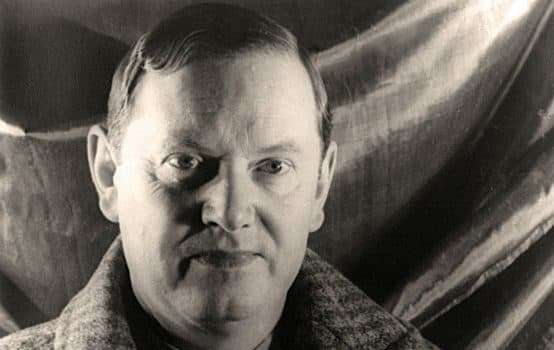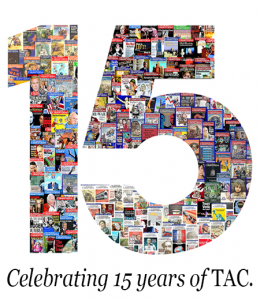
The English military historian John Keegan has described Evelyn Waugh’s Put Out More Flags as “the greatest English novel of the Second World War.” Impressive praise given the competition, especially Waugh’s own highly regarded trilogy of World War II, Sword of Honor.
Put Out More Flags appeared during the darkest days of the war, in March 1942, while the British were suffering a string of embarrassing setbacks in Egypt and the North Atlantic. Written in 1941 after the English defeat at the battle of Crete, Waugh told his father that it was “a minor work dashed off to occupy a tedious voyage” home from the Mediterranean theater. It was anything but.
Put Out More Flags is one of Waugh’s most underrated novels. It is also a seminal work in the transformation of Waugh from the author of savage satires about the “Bright Young Things” of the late 1920s and early 30s like Decline and Fall, Vile Bodies, Black Mischief, and Scoop, to the more sober novelist of the postwar crisis of faith. It’s filled with the characters who once trotted mindlessly through those books, the “wealthy ill-mannered louts whose action left havoc in their wake,” men like Basil Seal, Peter Pastmaster, Alastair Digby Vane Trumpington, “Bright Young Things” all. It is also the novel that foreshadows the more serious postwar world of Charles Ryder in Brideshead Revisited and Guy Crouchback in Sword of Honor. As such, Put Out More Flags is worth a second look.

The novel is set in the months between the outbreak of war in September 1939 and Hitler’s onslaught in the West in May 1940—or as Waugh described it, “in that cozy interlude between peace and war, when there was leave every week-end and plenty eat and drink and plenty to smoke, when France stood firm on the Maginot Line and the Finns stood firm in Finland….” In part, what gives the novel such vividness is that these months were the happiest for Waugh during the war. He was training as a soldier in Kent and enjoyed the interlude of action from writing. He also was storing up details for future books. The first volume of the Sword of Honor series, Men At Arms, emerged from these days of soldiering. The disillusion Waugh came to feel about the war, especially when the English allied with the Soviet Union after the German attack in June 1941, does not run through Put Out More Flags as it does in Sword of Honor.
One of the most appealing aspects of the novel is Waugh’s genuine affection for the main characters, especially the female ones: Basil’s batty sister Barbara; his lover Angela Lyne; and Sonia Trumpington, Alaistair’s wife, all in Waugh’s phrase part of the “wreckage of the roaring twenties.” They all are sketched affectionately and with warmth; no longer the brainless females of his earlier novels, they are key figures whom Basil’s, Peter’s, and Alastair’s lives revolve around.
The novel divides into two halves. The first is largely devoted to Basil’s schemes to take advantage of the conflict. He tells Barbara that he wants “to be one of those people one heard about in 1919: the hard-faced men who did well out of the war.” She agrees that Basil needs a war. He first finds success in exploiting a trio of ghastly children from some urban slum to blackmail families in his sister’s village, making a tidy sum from those willing to pay not to billet them. The children bear the name “the Connollies,” Waugh’s way of always finding a disreputable character to embarrass his old friend, the writer Cyril Connolly. (In Black Mischief, the commander of the army was a crude one-eyed General Connolly who had a wife named “Black Bitch.” Connolly was long suffering and half-enjoyed the notoriety.)
Along the way Waugh took a pot shot at another bête noire, the writers W.H. Auden and Christopher Isherwood. They had left England for the United States when the war broke out. This irritated Waugh who showed no mercy in creating two characters, Parsnip and Pimpernell, based on them. The two were the epitome of the engaged writers who, in what he calls their “chumminess,” “ganged up and captured the decade of the 30s,” then “at the first squeak of an air-raid warning” took off for America. Waugh put his view of the two through the person of a young communist woman. “What I don’t see is how these two can claim to be Contemporary if they run away from the biggest event in contemporary history….” Waugh could be unforgiving although he came to regard Auden as an amiable companion. The thoroughly English Isherwood he later playfully described as a very talented American writer.
The second half of the book traces a kind of redemption for what Waugh described as this “race of ghosts.” In different ways, they all atone for their shallow pasts. Alastair Trumpington refuses a commission in the army and instead volunteers for a commando-like military outfit. When Sonia asks if it’s dangerous, Alastair’s answer is perfect Waugh: “I don’t suppose so really. But very exciting…. They have special knives and Tommy-guns and knuckle dusters: they war rope-soled shoes…. They carry rope ladders round their waists and files sewn in the seams of their coats to escape with. D’you mind very much if I accept?” “No, darling” she answers. “I couldn’t keep you from the rope ladder. Not from the rope ladder. I couldn’t. I see.”
Peter Pastmaster marries a spirited young girl his mother arranged for him to meet and together they rescue Angela who they find drunk in the street. Like Alastair, he joins a special unit and goes to war happily with the blessing of his new wife. Angela’s separated husband, Cedric, dies bravely fighting in a useless campaign in Norway. Even Basil seems to have found a place for himself. Peter Pastmaster arranges for him to join one of the special military forces and returns to Angela and proposes marriage. “Do you want to marry me?” Basil asks Angela. “Yes, I think so. Neither of us could ever marry anyone else, you know…. I shall be a terrible husband.” “Yes, darling, don’t I know it? But you see one can’t expect anything to be perfect now. In the old days if there was one thing wrong, it spoiled everything; from now on for all our lives, it there’s one thing right the day is made.”
Except for Basil Seal, Waugh never revived these characters. It was almost as if he was bidding goodbye to the “Bright Young Things” world that he first created. Put Out More Flags, a valedictory to them, was a considerable success, selling over 175,000 copies. And though Waugh didn’t hold it in high esteem, it evinces a shift from savage satires to a more nuanced understanding of the world, a view first sketched in his bleak novel A Handful of Dust. No longer the supreme jokester of the worthless, restless sons of the aristocracy turned dissolute (with the exception of The Loved One, a special case resulting from his exposure to the world of California), Waugh’s later novels turn to more serious topics, especially the question of faith in the modern world. Put Out More Flags, still hilarious in parts, is the beginning of Waugh’s quest for something more meaningful in life, one that would lead directly to Brideshead Revisited.
John Rossi is professor emeritus of History at La Salle University.
Sourse: theamericanconservative.com






